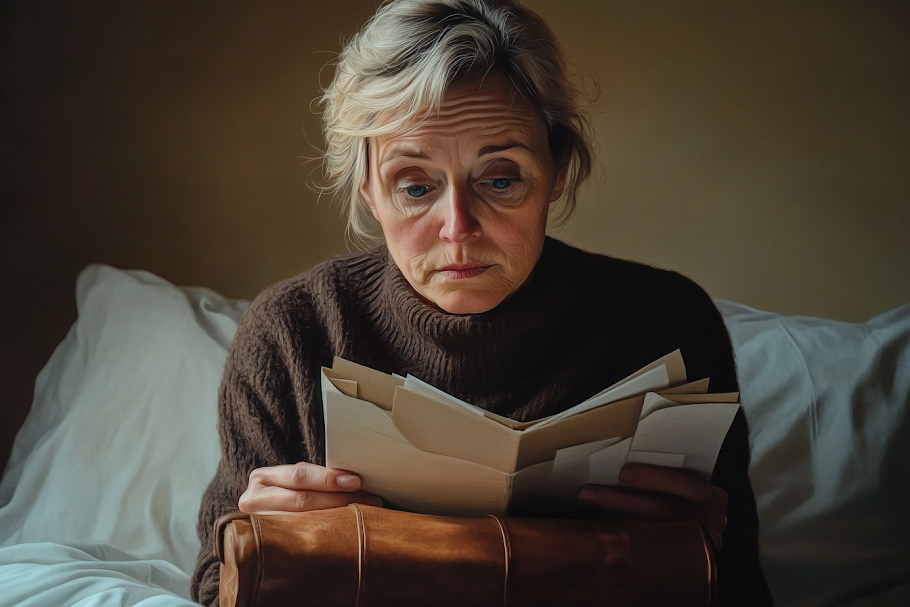Steve spent his entire life in foster care, clinging to the hope that one day, he’d find the mother who left him behind. He imagined their reunion a thousand times—tears, apologies, maybe even an embrace.
Instead, when he finally stood at her doorstep, the first words out of her mouth were:
“I THINK YOU’RE HERE FOR WHAT’S IN THE BASEMENT.”
Then, she led him downstairs—where the truth waited in the dark.
For twenty years, I wondered what it would feel like to look my mother in the eyes and ask, Why did you leave me?
From one foster home to another, I held onto a fragile hope: that she never wanted to give me up. That there was a reason. That somewhere, in some hidden corner of the world, I mattered to someone.

Her lullabies were still etched in my memory—like a blade slicing through years of birthdays spent alone, Christmas mornings without presents, and the ache of an empty chair where a mother should have been.
Every night, I closed my eyes and pictured a woman I had never seen. I told myself she was out there. I just had to find her.
When I turned eighteen, I started searching. It wasn’t easy. I didn’t have her last name—just Marla. No pictures. No clues. Only the ghost of her voice lingering in my dreams.
Years passed. I combed through foster care records, burned through money on private investigators, and chased leads that dissolved like smoke. Every failure left me with nothing but the bitter taste of disappointment.
Then, just after my twentieth birthday, I caught a break.
One of my former foster parents, Sharon—the closest thing I ever had to a real mother—found an old envelope buried in a box of my childhood things. Scrawled in blue ink on the back of a faded document was an address.

She hesitated before handing it to me. “I didn’t think it was my place,” she said softly.
And there, in shaky handwriting, was her name.
Marla.
I could feel it in my bones. It had to be her.
The town was only two hours away—close enough to touch, yet impossibly far.
I saved up for a suit. Not fancy, just something that made me look like the son she never knew. I bought a bouquet of daisies.
Then, as an afterthought, I stopped by a bakery and picked up a chocolate cake. I didn’t know why. Maybe it was a peace offering. Maybe I was trying to make this meeting feel like something worth celebrating.
The drive felt like a journey through twenty years of unanswered questions.
By the time I reached her house, my legs felt like lead. The brown paint on the door was chipped, and the brass knocker was tarnished to green. My pulse hammered as I knocked.
The door creaked open, and there she was.
Older than I imagined. Wrinkles carved deep into her face, silver streaking her dark hair. But her eyes… God, they were my eyes.
“Are you Marla?” I asked, my voice barely above a whisper.
She studied me, tilting her head—something flickering behind her expression. Recognition? Guilt?
“I’m Steve,” I blurted. “I… I think I’m here to find you.”
She didn’t cry. She didn’t reach for me. Instead, her lips curled into a strange, unreadable smile.
“No,” she said. “I THINK YOU’RE HERE FOR WHAT’S IN THE BASEMENT.”
I gripped the daisies a little tighter. “I… I don’t understand.”
“Come with me.” Her voice was calm. Not like a mother reunited with her lost son, but like a guide leading someone into unknown territory.
I hesitated. This wasn’t how reunions were supposed to go. But still… I followed.
The house smelled of mothballs and dust, with something metallic lingering beneath. The wooden floors groaned under our steps.
“Can we talk first?” I asked, my voice unsteady. The flowers in my hands felt absurd now. “I came all this way—”
“We’ll talk,” she interrupted. “But first, you need to see something.”
The basement door loomed at the end of the hall, its paint peeling in long, curling strips. She opened it without a word.
I hesitated. The air spilling up from the stairwell was heavy. Cold.
Still, I followed.
At the bottom, she stopped in front of an old iron trunk. Rusted hinges. A thick layer of dust.
She knelt and flipped it open.
Inside were photographs. Hundreds of them. A lifetime of images.
And every single one was of me.
Newborn photos. School pictures. Candid shots of me at parks, walking home from school, laughing with friends. Images of my entire life—some taken from a distance, some so close I could see the smallest details of my face.

“What… what is this?” My voice wavered. My breath hitched.
Marla reached into the trunk and pulled out a picture. I recognized it instantly—it was me as a teenager, sitting on a park bench, lost in a book.
A photo I never knew was taken.
“I’ve been watching you,” she said, her voice thick with something between pain and obsession.
“Watching me?” My stomach twisted. “You mean… stalking me?”
Her eyes met mine. “I needed to know you were okay.”
Anger flared hot in my chest. “Okay? You abandoned me. You let me rot in foster care. You watched me struggle and did nothing.”
Her voice cracked. “I wanted to come for you. But—”
“Why?” My hands shook. “Why didn’t you?”
She hesitated, then whispered:
“Because I thought I was protecting you. Your father… he wasn’t a good man.”
My breath caught.
“I thought if I gave you up, he’d never find you,” she said, her voice trembling. “That you’d be safe.”
I let out a bitter laugh. “Safe? You think foster care was safe?”
Tears welled in her eyes. “I know I was wrong. And I’m sorry, Steve. I am so, so sorry.”
I didn’t know if I could forgive her.
But as I sat on that cold basement floor, surrounded by fragments of my stolen past, I knew one thing:
Maybe we could figure out where to go from here.
It wasn’t perfect. But it was a start.
A fragile bridge between us—built on the thinnest thread of hope.